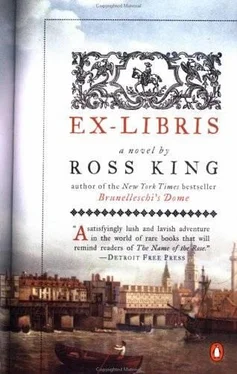Pontifex Hall no longer safe? I was puzzled by her claim. Why on earth not? Because of the torrents of water from the spring that were supposedly eroding its foundations? Or was there some more menacing reason?
'Of course, no one has inhabited Pulteney House for almost ten years,' she was now saying, 'so it's hardly comfortable. The pipes from the conduit have been plugged or broken, therefore we have no water. Even more inhospitable conditions, I fear, than Pontifex Hall.' She smiled briefly, then her eyes flickered for the dozenth time to the copy of Agrippa's Magische Werke , which was still clutched in my hand. 'Please, Mr. Inchbold.' She was gesturing at the plates of food-venison from one of Sir Richard's deer parks-which Bridget had served a minute earlier. 'Shall we begin? I believe we have much to talk about.'
And so as the candle flame did its fairy-dance between us I told her everything I had learned in the past couple of days; or very nearly everything. I was wondering how much I should reveal. I decided to say nothing of the cipher or my suspicions about being followed. But I told her about the Golden Horn, about the bizarre auction, about Dr. Pickvance, and finally about the enormous pile of catalogues that I had finished inspecting only two hours earlier. Yet she was not as baffled by the name Henry Monboddo, I discovered, as I had been. We were eating our pudding, a syllabub, by this point. I paused for a moment and then asked whether she knew the name.
'Indeed I do,' she replied simply, then fell silent for a spell, contemplating her reflection in the silver cheek of the soup tureen. I could see the reflections of the candle, two perfect flames, in her dilated pupils. At length she set aside her spoon and picked up her napkin to dab carefully at her lips. 'In fact,' she said at last, 'Henry Monboddo is my reason for inviting you to Pulteney House tonight.'
'Oh?'
'Yes.' She was rising from the table, and so I did the same-a little too quickly. My head felt giddy because of the wine. 'Come with me, Mr. Inchbold. There is something I must show you. You see, I too have made a discovery about Henry Monboddo.'
I was led along the corridor, then through a small rotunda and into a bedchamber. It appeared that Sir Richard had at least attempted to make this part of Pulteney House hospitable for his guest, because the walls were newly papered and the room had been furnished with a four-post bed, a chair and a looking-glass whose foxed surface gave back my freakishly foreshortened and hunchbacked reflection as I stumbled into the room. There was also a portmanteau on the floor beside the bed with several garments protruding untidily from its top. I stood inside the door as if frozen, like a tobacconist's wooden Indian.
'Please, Mr. Inchbold.' She pointed to the chair before bending over the portmanteau. The window had been pushed open, and I caught the gentle susurrus of velvet curtains. 'Won't you take a seat?'
I moved to the chair and watched, anxious and alert, as she rummaged in the trunk, first through a layer of the clothing-I caught sight of a series of shifts and smocks writhing beneath her touch-and then in a deeper sediment. At last she found what she was looking for, a sheaf of papers, which she extracted and then handed to me.
'Another inventory,' she explained, seating herself on the edge of the bed.
'Like that at Pontifex Hall?' I remembered the document well: those six wondrous pages, each signed by the four bailies.
'No, not quite the same. This one was compiled almost thirty years later. It includes only books, as you can see. The contents of the library at Pontifex Hall in the year 1651.'
'Immediately before the estate was seized.'
'Yes. Lord Marchamont had the contents of the library valued before we went into exile. He was planning to sell the entire collection. We were… embarrassed for funds. But no buyer could be found. Not in those days. No one, that is, to whom Lord Marchamont had any wish to sell the collection. So he next considered removing the library to France. He had even arranged for its passage across the Channel from Portsmouth on the Belphoebe , one of the few men-o'-war that hadn't deserted to Cromwell in 1642. But the plan fell through, of course. The Belphoebe went down off the Isle of Wight less than a fortnight before the books were due to be sent from Pontifex Hall. A freak storm. But the shipwreck was fortunate for the collection, as it turns out. I need not tell you what would have happened otherwise.'
Indeed not. A number of libraries that had been transferred to France for safekeeping during the Civil War had become the property of the French Crown, by Droit d'Aubain , upon the deaths of their owners. A fate that Sir Ambrose's books would no doubt have shared when Lord Marchamont died.
'I discovered the inventory in the muniment room,' she was continuing, 'in the bottom of the coffin, one day after you left Pontifex Hall. Otherwise I would most certainly have given it to you then.' She was leaning forward from the bed. 'Quite detailed, as you will see.'
'It mentions the parchment?'
'Of course. But that detail is not the most interesting piece of intelligence. Please, the last page, if you will. There you will see how the collection was inventoried and valued by the person whom Lord Marchamont had engaged to sell it.'
The document was at least fifty pages long, an endless swarm of authors, titles, editions, prices. My head swam. I had already read too many catalogues that day. But the last page was blank, I saw, except for a few words inscribed at the bottom: ' This entire Collection valued at the sum of 47,000 pounds sterling, on this day, the 15 thof February 1651, by Henry Monboddo of Wembish Park, Huntingdonshire. '
I felt a tightening in my belly and looked up to find Alethea studying me closely.
'Henry Monboddo,' she murmured thoughtfully. 'A man well known among the Royalist exiles in Holland and France.'
'You knew him, then?'
'I did indeed.' She reached for the inventory and carefully returned it to the portmanteau. 'Or, rather, I met him on one or two occasions. He worked out of Antwerp in those days,' she continued, the bedposts gently creaking as she resumed her seat. 'He was a picture-monger, an art-broker. He sold the contents of many libraries and galleries, including those from York House. You know of the collection?'
I nodded, remembering Pickvance's catalogue for the year 1654, with its description of the items from the 'admirable collection' of the second Duke of Buckingham.
'Those were difficult times for all of us. Buckingham was also embarrassed for funds. York House had been confiscated and many of its treasures, those collected by his father, were pillaged by Cromwell's men. So in 1648, in order to relieve the Duke's finances, Monboddo sold some two hundred of the paintings. He got him a fair price, because the Peace of Westphalia had recently been signed and therefore the supply of plunder was threatening to dry up. Indeed, after Westphalia the stream might well have disappeared altogether had it not been for our commotions here in England.'
'So Monboddo disposed of collections of books and paintings for insolvent exiles? For anyone whose estate was being sequestrated?'
She nodded. 'He found the buyers for their art collections. Dukes and princes who wished to stock their libraries and cabinets. He had connections in courts throughout Christendom. My father dealt with him on a number of occasions when he made purchases for the Emperor Rudolf.'
'You mean to say that Monboddo was known to Sir Ambrose?'
'Yes. Many years earlier, of course. He conducted the negotiations with agents such as my father and took a handsome commission in return.' Her gaze dropped to the copy of Agrippa clutched in my hand. 'I believe he even negotiated with my father over the purchase of the von Steiner collection in Vienna. But there were also rumours about Monboddo's work,' she added. 'He was said to have clients other than Royalists unable to pay the taxes imposed on their estates.'
Читать дальше












